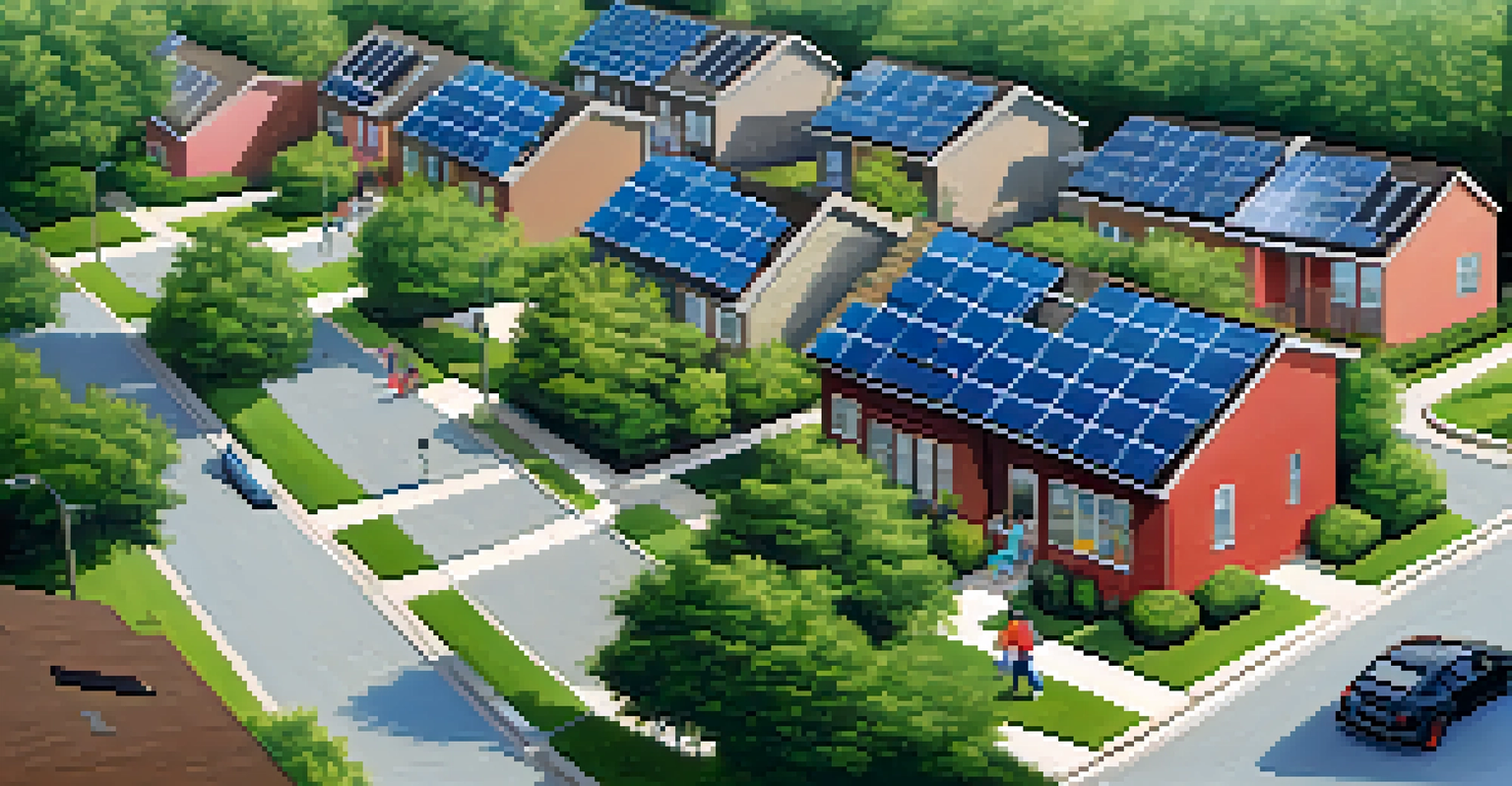Community Engagement in Houston's Renewable Energy Projects

Understanding Community Engagement in Renewable Energy
Community engagement in renewable energy refers to the active involvement of local residents in energy projects that impact their environment and lives. In Houston, this means not only informing citizens about new renewable initiatives but also involving them in the decision-making process. By fostering a collaborative atmosphere, project developers can create solutions that address community needs and values.
We must not only engage with communities, but also empower them to be active participants in their energy future.
Effective engagement helps build trust between energy companies and the communities they serve. When residents feel like their voices are heard, they are more likely to support renewable projects, leading to a smoother implementation process. This collaborative approach ensures that the benefits of renewable energy—like cleaner air and job creation—are shared equitably among all stakeholders.
Moreover, community engagement can take various forms, from public meetings and workshops to social media campaigns. For instance, Houston has seen successful initiatives where local residents participate in brainstorming sessions to discuss energy solutions tailored to their neighborhoods. Involving the community early on helps identify potential concerns and fosters a sense of ownership over the project.
The Role of Local Organizations in Engagement Efforts
Local organizations play a crucial role in bridging the gap between renewable energy developers and community members. These groups often have established trust and credibility within the community, making them valuable allies in engagement efforts. By partnering with these organizations, energy projects can leverage existing networks to disseminate information and gather feedback.

For example, environmental nonprofits in Houston have been instrumental in organizing community forums that educate residents about the benefits of renewable energy. These forums also serve as a platform for residents to voice their concerns and ask questions. This two-way communication is vital for ensuring that community perspectives are considered in project planning.
Community Involvement Boosts Trust
Engaging local residents in renewable energy projects fosters trust and collaboration, leading to smoother implementation.
Additionally, local organizations can help facilitate workshops that empower community members to take action. Whether it’s advocating for renewable policies or participating in green initiatives, these organizations inspire collective action and enhance community resilience in the face of climate challenges.
Case Study: Houston's Solar Energy Initiatives
One of the standout examples of community engagement in Houston's renewable energy projects is the city's solar energy initiatives. Over the past few years, Houston has implemented several solar programs designed to increase access to clean energy while engaging residents in the process. These initiatives often include community workshops to educate residents about solar technology and its benefits.
Community engagement is not just about informing people; it's about involving them in the decision-making process.
In these workshops, participants learn about the financial incentives available for installing solar panels, as well as the environmental impact of transitioning to solar energy. This not only informs residents but also encourages them to consider solar solutions for their homes. By actively involving the community, Houston has seen a significant uptick in solar installations across various neighborhoods.
Moreover, local solar cooperatives have emerged as a result of these initiatives, allowing residents to purchase solar energy collectively. This approach not only reduces costs but also fosters a sense of community as neighbors work together towards a common goal of sustainable energy use. It's a perfect example of how community engagement can lead to tangible benefits.
Challenges in Community Engagement
Despite the positive outcomes of community engagement, there are challenges that can complicate the process. One common issue is misinformation, which can create skepticism among residents regarding renewable energy projects. Addressing these misconceptions requires consistent communication and transparency from project developers to build trust.
Another challenge is ensuring that engagement efforts are inclusive and represent the diverse demographics of Houston. Certain communities may be more difficult to reach due to language barriers or lack of access to technology. It’s essential for engagement strategies to be adaptable and culturally sensitive to effectively connect with all community members.
Local Organizations Enhance Engagement
Partnerships with local organizations help bridge the gap between energy developers and communities, facilitating effective communication and feedback.
Lastly, the pace of renewable energy development can sometimes outstrip community engagement efforts. As new projects arise rapidly, it can be challenging to maintain ongoing dialogue with residents. Therefore, establishing long-term relationships with the community is crucial for sustainable engagement, ensuring residents remain informed and involved throughout the project lifecycle.
Innovative Engagement Strategies in Houston
Houston has embraced innovative engagement strategies to enhance community involvement in renewable energy projects. One noteworthy approach is the use of digital platforms to connect with residents. Online surveys, webinars, and social media campaigns allow for broader participation, especially among younger demographics who are more tech-savvy.
For instance, a recent initiative used social media to launch a campaign that encouraged residents to share their thoughts on renewable energy. This not only amplified community voices but also created a sense of camaraderie among participants, as they exchanged ideas and experiences. The interactive nature of these platforms keeps engagement lively and relevant.
Additionally, gamification techniques are being explored to make learning about renewable energy fun and engaging. By incorporating elements like quizzes and challenges, residents can learn about energy conservation and sustainability in an enjoyable way. This innovative approach not only captures attention but also fosters a deeper understanding of the importance of renewable energy.
The Impact of Engagement on Project Success
Community engagement significantly impacts the success of renewable energy projects in Houston. When residents are actively involved, projects are more likely to align with community values and priorities. This alignment reduces resistance and fosters a cooperative environment, which is essential for smooth project execution.
Furthermore, engaged communities can serve as advocates for renewable initiatives, helping to promote the benefits to a broader audience. Their testimonials and support can sway public opinion, encouraging more residents to adopt clean energy solutions. This grassroots advocacy not only enhances project visibility but also contributes to a culture of sustainability within the community.
Innovative Strategies Drive Participation
Utilizing digital platforms and gamification techniques enhances community engagement, making it more accessible and enjoyable for residents.
Ultimately, successful community engagement leads to long-term benefits, including increased local investment and job creation in the renewable sector. When communities feel empowered, they are more likely to support ongoing energy transitions, paving the way for a greener, more sustainable future for Houston.
Looking Ahead: The Future of Engagement in Houston
As Houston continues to expand its renewable energy projects, the future of community engagement looks promising. With advancements in technology and communication, there are greater opportunities to involve residents in meaningful ways. This evolution will likely result in even more innovative approaches to engagement that resonate with diverse community members.
Moreover, as climate change becomes an increasingly pressing issue, the urgency for community involvement in sustainability efforts will grow. Houston can serve as a model for how cities can engage their residents in renewable energy initiatives, showcasing the importance of collaboration in tackling environmental challenges.

In conclusion, fostering strong community engagement in Houston's renewable energy projects will not only enhance project success but also create a more informed and active citizenry. As we move forward, it's essential to prioritize these relationships and continuously seek input from the community, ensuring that everyone has a stake in the city's green future.